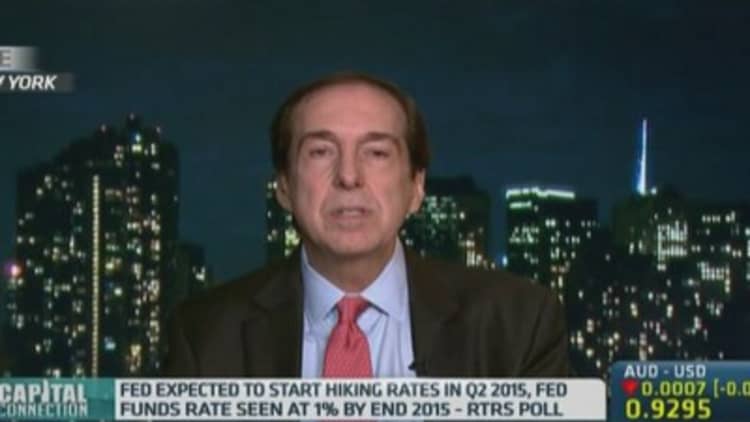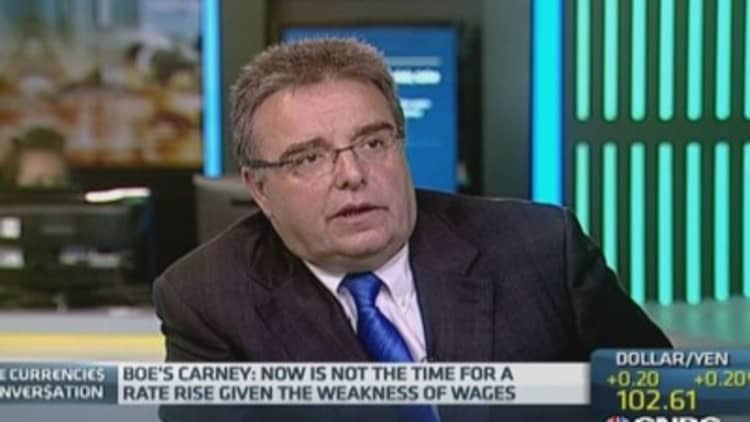After a slew of bad data across the globe this week, the market may need to start rejigging its expectations for the end of easy monetary policy, some analysts said.
"It's been a building sense in the last couple of months," across regions as diverse as Australia, New Zealand, Korea and even the U.K., said Richard Jerram, chief economist at Bank of Singapore, although he added that the U.S. is a "notable exception."
Read More Why Asia can get a fillip from high household debt
This week has been a disappointing one for data watchers. Despite stimulus measures in recent months, China released a flurry of patchy data Wednesday, with credit growth and retail sales both missing forecasts.

Japan's gross domestic product (GDP) on Wednesday showed an annualized contraction of 6.8 percent on-year in the second quarter; while in the U.S., July retail sales data were flat, the weakest reading since January.
And, in the euro zone, Germany's economy contracted in the second quarter, while France's stagnated, data Thursday showed.
Read More Fed is exactly where it should be right now: Pimco's McCulley
"[The recovery] is not as healthy as perhaps the individual countries thought three to six months ago," Jerram said. It presents a dilemma for markets, as U.S. interest rate hikes get closer even as policy moves in other markets are pushed back, he said. Bank of Singapore is sticking with its call for the U.S. Federal Reserve to hike rates in the second quarter of next year.
"That's probably the hardest calculation to make," Jerram said. "Our general sense is that Korean rates matter to Korea, Australian rates matter to Australia, but U.S. rates matter to everyone."
Others expect the poor data will just kick the tightening can further down the road, rather than create an interest rate dichotomy.
Read More 'Goldilocks' jobs report fuels Fed interest rate debate
"The big question this year has been when will the Fed start to raise rates. The run of soft data we're seeing globally and in the U.S. just tells us that's a fair way away," said Shane Oliver, head of investment strategy at AMP Capital.
To be sure, not everyone expects the interest rate scales have shifted much.

"I don't think we should read too much into [the poor data]," Mark Matthews, head of research for Asia at Julius Baer, said, citing the lack of a common denominator in the misses.
He noted that China's credit data miss in July followed exceptionally strong data in June, while the U.S. retail sales data was on a decline in car sales and Europe faces concerns over the tensions between Russia and Ukraine.
Matthews doesn't expect significant U.S. interest rate hikes will materialize anytime soon.
Read More Rates could rise 'early next year': Fed's Fisher
"There was a bit of an argument building that the economy in the U.S. and Britain were starting to build some serious steam and the natural follow-through with that is that you'd expect some interest rate adjustment," Matthews said.
"But the market has just realized that this Federal Reserve is extremely dovish," he said. "There's recognition that [Fed chief Janet Yellen] is a very liberal economist and she would rather risk some inflation than in any way endanger this recovery that has just begun."
AMP's Oliver also doesn't expect much in the way of changed expectations.
"The data were not disastrous," he said, noting the China data were "normal noise" and describing the recovery as "two steps forward, one step back." But he added, "It's not the sort of environment where the Fed would want to take risks with the U.S. recovery or going too early on rates."
—By CNBC.Com's Leslie Shaffer; Follow her on Twitter @LeslieShaffer1

